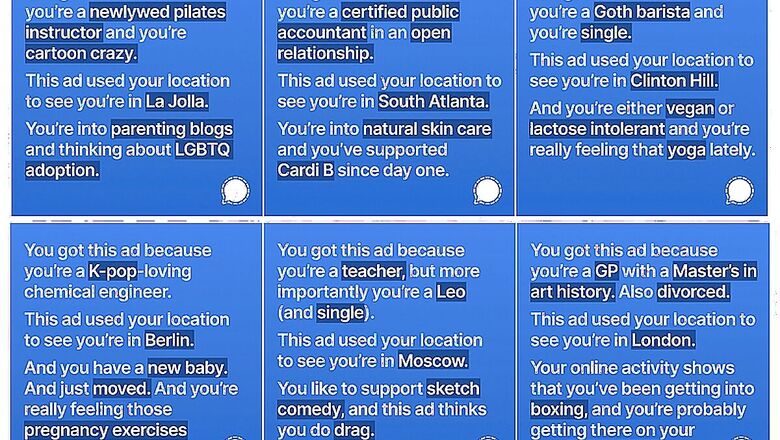
views
That Facebook uses, and to a large extent exploits user data openly and widely to serve its commercial purposes is really to nobody’s surprise any longer. However, that’s exactly what the company prohibited from doing for a series of ads that were planned to be promoted on Instagram. The promoter, a bit unsurprisingly, was Signal – the privacy centric communication app that rose to the spotlight following WhatsApp’s big privacy controversy in recent times. While the latter attempted to run a number of ads on Instagram highlighting how Facebook collates private and seemingly random user data from everywhere to sell digital identities and surveillance to advertisers, Facebook seemingly blocked the Foundation from running them.
Selling visibility into lives?
“They collect everything they can from FB, Instagram, and WhatsApp in order to sell visibility into people and their lives,” opens the Signal Foundation blog post, adding, “We created a multi-variant targeted ad designed to show you the personal data that Facebook collects about you and sells access to. The ad would simply display some of the information collected about the viewer which the advertising platform uses. Facebook was not into that idea.”
The series of advertisements gave a pretty clear lowdown of the sheer amount of information that Facebook has about users under its umbrella. This includes information collected by Facebook from the main Facebook and Messenger apps, Instagram and even user metadata generated by the apparently private messaging app, WhatsApp. The data also includes off-Facebook activity generated from third party websites that use Facebook’s off-site tracker, the infamous Facebook Pixel.
As the ad highlights, Facebook’s collected data includes details such as occupation, most streamed content on the internet, live GPS coordinates, type of content scrolled or read, sexual preference, favourite musicians, relationship status, religious beliefs, food allergies, latest purchases, owned cars or bikes, workout preferences, education history and more. To this, Signal claims that Facebook didn’t take too kindly to its ad campaign, and has since disabled Signal’s advertisement account on Instagram. Whether you find that surprising or otherwise will largely depend on what you feel about Facebook – and Mark Zuckerberg, in general.
Specific curation or policy breach?
As the Signal blog post stated, “Facebook is more than willing to sell visibility into people’s lives, unless it’s to tell people about how their data is being used. Being transparent about how ads use people’s data is apparently enough to get banned; in Facebook’s world, the only acceptable usage is to hide what you’re doing from your audience.” Such allegations have constantly hammered on the company’s ethics doors, which chief Zuckerberg has attempted to play down by talking about caring about his billions of users or giving them “choice”. In truth, though, completely avoiding being tracked by Facebook remains difficult.
Facebook does not seem to have responded yet to Signal’s claim that its ad account was blocked, preventing it from running the campaign. The range of ads do not seemingly violate any Facebook content or ad policy in general, so there’s clearly some amount of specific curation going on here. The question is, would Facebook have a clear reason to defend doing this, or deny blocking Signal from using its platform, entirely?
Read all the Latest News, Breaking News and Coronavirus News here. Follow us on Facebook, Twitter and Telegram.




















Comments
0 comment